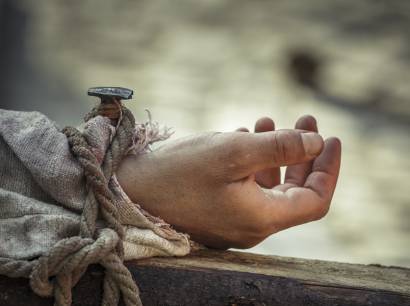This Week's Story
subscribe to podcast [click here] or play audio below
In Uncle Tom's Cabin people are real. They hope and despair, love and hate.

This Week’s Story relives American history and the Bible through brief inspiring stories presented on mp3 audio recordings and text for reading.
I just grew!
My grandma’s lessons often were stories. One day she asked me, “Barbara, do you know what Topsy said when she was asked how she grew up?”
“No, Nonnie, I don’t.
She began telling me Topsy’s story as it is found in the book Uncle Tom’s Cabin.
Topsy ‘s new owner asked her, “Have you ever heard anything about God?”
Topsy grinned, but said nothing.
“Do you know who made you?”
“Nobody, as I knows on,” said Topsy. She laughed and added, “I spect I grow’d. Don’t think nobody ever made me.”
It was a funny sad story, I thought, and it stuck in my brain.
I remember another character, Tom, from Uncle Tom’s Cabin. I’ve heard people called Uncle Toms, if they were too helpful to white
people. I don’t think people’s name-calling is fair to Tom. He is much more than a boot-licker. I admire him.
Uncle Tom was a slave in Kentucky, married, and with children. He expected to be set free, but his master got into debt and sold him. The sale was peculiar, because here is how his master described him. “Tom is a good, steady, sensible, pious fellow. He got religion at a camp-meeting, four years ago; and I believe he really did get it. I’ve trusted him, since then, with everything I have,--money, house, horses,--and let him come and go round the country; and I always found him true and square in everything.”
Tom’s sale was a stupid financial decision. His master probably went worse into debt. For Tom it was the painful loss of his family and his expectation that he would be freed.
He was sold down the Mississippi River to arrive in New Orleans to be auctioned for perhaps thirteen hundred dollars. His new owner, St. Clare, was wealthy, kind to his slaves, but too cynical to live up to his own ideals. His wife was devoted to herself.
St. Clare’s little daughter, Eva, was welcome sunshine. His wife revealed their family, when she said, “Eva always was disposed to be with servants; and I think that well enough with some children… But Eva somehow always seems to put herself on an equality with every creature that comes near her. It’s a strange thing about the child. I never have been able to break her of it. St. Clare, I believe, encourages her in it. The fact is, St. Clare indulges every creature under this roof but his own wife.”
After Eva and St. Clare die, Tom is sold. Again he has been promised his freedom. Too late! He is sold to Simon Legree, who is proud to be cruel. Tom refuses deceit and works hard. He is helpful to the people around him. He delights in reading the Bible, though he cannot read well and is allowed little free time.
Simon Legree despises him and cannot force him to whip another slave. So a terrible beating is given to Tom. After this Tom struggles with living day after day with meanness and exhaustion. When he sees a vision of Jesus suffering with majestic patience, his cheerfulness and alertness return. He even feels compassion for Legree. Another ferocious beating comes and Tom dies, but it is a strange dying, harsh, but for Tom not a loss.
This is Barbara Steiner with memories of an old book where people face challenges with hope and despair, apathy and action. Please check out thisweeksstory.com.
<< previous story] [next story >>
We invite your comments! [click here to comment]
This Week's Story is a non-profit supported by listeners. [click here to make a donation]
